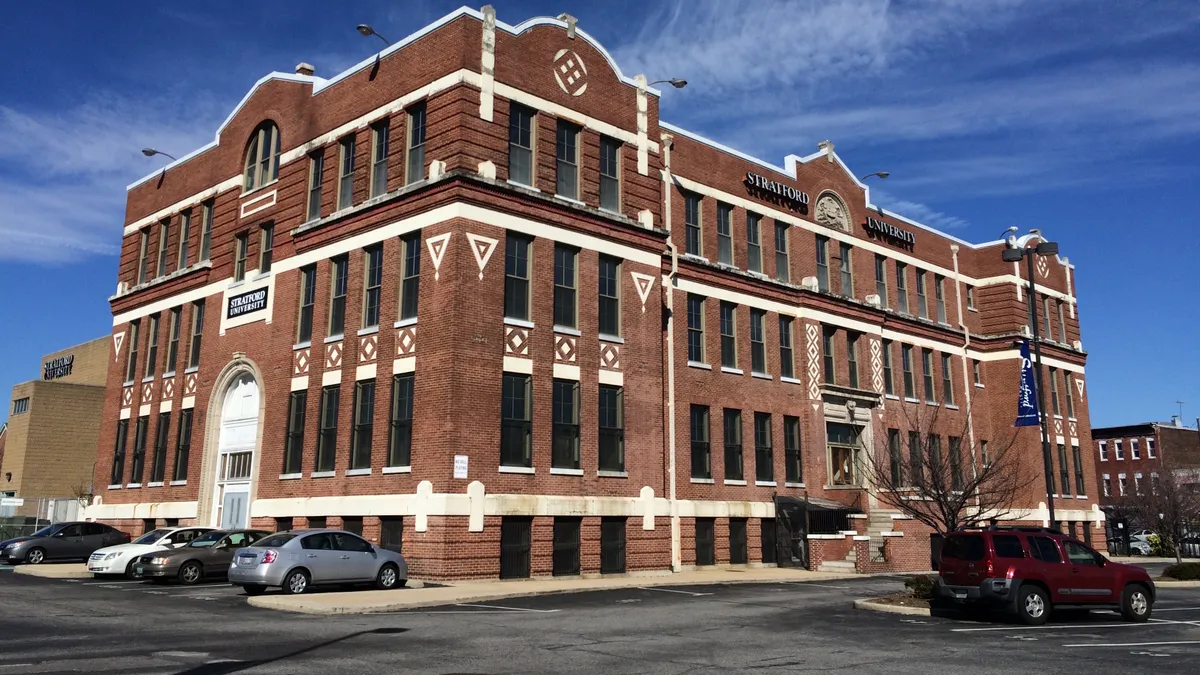Dive Brief:
- Stratford University, a for-profit institution with campuses in Virginia, Maryland and India, is planning to close Sept. 30, the end of the current term.
- The university informed students via email Friday. Stratford is closing about a month after the U.S. Department of Education revoked recognition of its accreditor, the Accrediting Council for Independent Colleges and Schools.
- The Education Department put strict requirements on ACICS colleges, including Stratford, such as barring them from enrolling new students who couldn’t complete programs within 18 months. Stratford President Richard Shurtz blamed the department’s restrictions for the institution’s closure, saying the agency overstepped its regulatory authority.
Dive Insight:
Without a stamp of approval from a federally recognized accreditor, a college cannot access federal financial aid, such as Pell Grants and student loans. For many institutions, losing access to that funding, called Title IV funding, can be fatal.
ACICS, a long-troubled accreditor of for-profit colleges, lost the Education Department’s recognition in August. The department said ACICS failed to come into compliance with requirements, such as having adequate resources and staff expertise.
The Education Department gave the two dozen or so institutions accredited by ACICS 18 months to find a new accreditor or else lose access to Title IV funding. In the meantime, the department put restrictions on the institutions, including requiring them to put up financial collateral and notify current students that they could lose access to federal financial aid.
Some policy advocates heralded the Education Department’s move to revoke recognition, saying it was long overdue and arguing that ACICS oversaw institutions with abysmal outcomes.
At Stratford, 30% of students graduate within eight years of enrolling, according to federal data. That’s compared to the middle point of 57% for all four-year colleges. Stratford’s average annual cost is $24,789, and students’ median earnings are $43,061.
Shurtz, who owns the college with his wife — who is Stratford's executive vice president — said the university was working toward securing accreditation with another agency before the Education Department imposed its restrictions. He estimated Stratford was about eight to 10 months away from getting approval from the Distance Education Accrediting Commission.
“Honestly, if they would have just let us enroll, we would have had a new accreditor in 10 months, and we would have just kept on trucking” Shurtz said. “I think they were worried that we would keep on trucking.”
The restriction on new students left the university without enough funds to keep operating. New students account for about 40% of Stratford’s revenue, Shurtz said.
The Education Department’s restrictions have put ACICS-accredited colleges into a precarious position, having to navigate strict requirements that could make it harder for them to stay open while actively seeking out new accreditors.
Shurtz expects other ACICS-accredited colleges will find themselves in the same position as Stratford.
“I doubt if any school can make it,” Shurtz said.
Stratford has about 1,000 students and 250 employees.
The University of the Potomac, another for-profit, has agreed to take Stratford's business and information technology students, Shurtz said. Stratford is working out a deal with Chamberlain University, also a for-profit, to take its nursing students. Oficials haven’t yet pinpointed a college where culinary and hospitality students can transfer their credits.
“I’ve got our entire staff working on trying to find a place where our students can land,” Shurtz said.
Stratford has stumbled into other troubles in recent years. In early 2020, NBC Washington reported that ACICS restricted enrollment at Stratford following allegations that the university was operating an unapproved program in Iraq. Stratford took ACICS to court over the matter, and the two parties later agreed to end the lawsuit.
The year before, Stratford closed three campuses in Virginia because they weren’t financially viable, The Virginian-Pilot reported. The closures affected around 550 students.
The Education Department did not answer questions about the closure by publication time.











